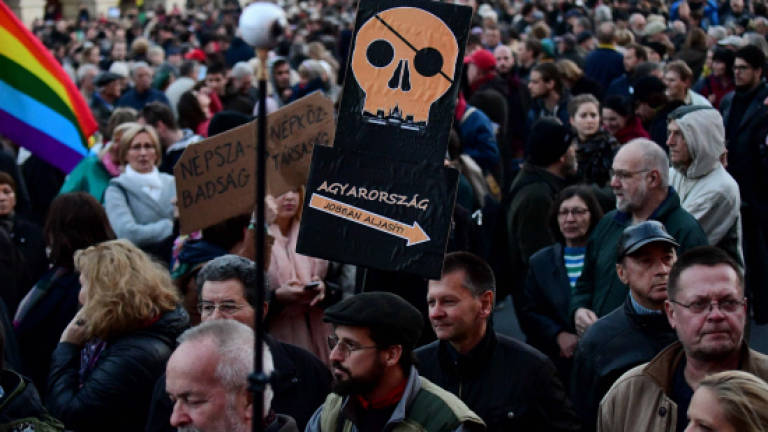Hungary's embattled journalists reeling after paper shut down

HUNGARIAN journalist Gabor Bordas thought he had seen it all. Over the past two years he had walked away from two top online news sites in protest over political interference.
But with no advance warning given to its staff of 90, Bordas called the sudden shutdown last week of Hungary's top-selling political daily Nepszabadsag the most "brutal" of all his experiences.
"It was humiliating and aggressive," he told AFP in a Budapest cafe, still shaken by the closure.
It treated "the readers and the public as if they were stupid", he added.
His travails in three different news outlets reflect the upheaval in Hungarian media since Prime Minister Viktor Orban began a strongarm realignment of the sector since taking power in 2010.
Nepszabadsag's publisher since 2014 Mediaworks, owned by Austrian magnate Heinrich Pecina, has said the paper's financial losses over the last decade were behind the drastic move.
And in extracts of an interview published online on Saturday Pecina defended the decision saying it had been governed by economics not politics.
"There is a mutual respect between me and Viktor Orban, but no form of dependence," he told the Austrian weekly Profil.
But for Borbas and others the explanation doesn't fit.
"If you want to improve a newspaper why shut it down, damage the brand, delete the online archive, and lose your subscribers," he told AFP.
On Oct 8, the 38-year-old editor in charge of the paper's website, noticed that the site was down but presumed it was a technical fault.
Answering the doorbell minutes later, he was handed a letter from Mediaworks informing him of the paper's suspension. It also stated that all email accounts had been blocked and that staff were not permitted to enter the premises.
Bordas only joined Nepszabadsag in July after quitting up-and-coming news site VS.hu when it emerged that it was financed by a foundation close to a key Orban ally.
"How could I send journalists to press conferences to hold a minister to account knowing how we were funded," he said.
In 2014, at the leading news portal Origo.hu, Bordas had joined a staff walkout when their editor was sacked soon after it published articles investigating a senior minister's travel expenses.
'Political challenge' to Orban
Orban's ruling right-wing Fidesz party called the Mediaworks move "a rational economic decision", but many were unconvinced.
"Nepszabadsag is a political challenge to the power of Orban and everyone knows that," its deputy editor-in-chief Marton Gergely told foreign reporters last week.
As the leading opposition paper, Nepszabadsag had several news scoops that embarrassed officials before the recent referendum that Orban called to "send a No message" to the European Union over its mandatory migrant relocation plan.
The 53-year-old premier's crusade to restrict critical voices in the media began soon after he won a supermajority at the 2010 election.
A media regulator was set up to monitor the "balance" of the reporting, while state television and radio were overhauled and exhibit a pro-government bias, for example 95% of their airtime on the recent referendum endorsed the government's position according to the research group Democracy Reporting International.
Advertising by state-owned companies has been syphoned from outlets not toeing the government line like Nepszabadsag and the broadcaster Klubradio.
Then in 2015, Orban was forced, partly due to EU criticism, to withdraw a tough tax on advertisements seen as targeting German media giant Bertelsmann's RTL television channel whose popular news programmes were often critical of the Hungarian leader.
'Constant fear in newsrooms'
As independent media have gradually been bought by government-friendly oligarchs, a fate widely expected for Nepszabadsag too, American journalist and longtime Budapest resident Tom Popper calls the internet "the last free frontier".
"But the government has more and more control there too, look at Origo now," Popper told AFP, citing the portal which now strictly follows a pro-Orban editorial line.
Until last month Popper was editor-in-chief at the English-language Budapest Business Journal but resigned after he said he was "ordered" by the publishers to avoid politics.
"Fidesz can now expect criticism of its government to drop by about 1,200 words a month," Popper wrote afterwards on a media watchdog website, accusing the party of "bullying tactics and intimidation".
"There is a constant fear in newsrooms that if you tick someone off there will be trouble," he told AFP.
Although Nepszabadsag – meaning "Freedom of the People" – was set up by the Communist Party in the aftermath of Hungary's failed anti-Soviet uprising in 1956, in recent years it had gained a reputation for quality reporting.
Expressions of solidarity for the paper even came from moderate rightwing media outlets, rare non-partisan gestures in Hungary's bitterly divided political landscape.
While its staff frantically seek ways to continue publishing, even visiting Vienna on Friday to demand answers at the headquarters of Pecina's firm, there's a press release still on the Mediaworks website.
Dated July 5 it announces the arrival of Gabor Bordas as part of Nepszabadsag's "innovation strategy leading up to 2020".
By now though Bordas says he has learned a hard lesson: "You cannot plan for the long-term in Hungarian media, anything can happen at anytime". — AFP